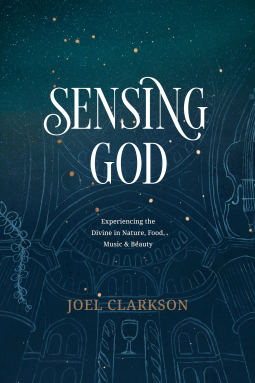Felt like church. [Sensing God by Joel Clarkson]
Sensing God is a discovery of Jesus in all of the sensory points embedded into each of us. It shows how the holiest acts in our daily lives are often the simplest: reveling in the beauty of nature; listening to our favorite music; eating a nourishing meal with family. These are potentially heartbeats of a living faith, and when we learn to recognize and respond to God’s goodness in them, it draws us into redemptive participation with Him, the source of all beauty.
Joel Clarkson shares personal stories and paints vivid imagery so that we, too, can taste and see (and hear and touch and smell) that the Lord is good. In our exploration, we meet Jesus, who invites us to enjoy his presence and proclaim his visible, tangible, and touchable gospel. We physically experience the glory of our Creator and at the same time, we make that encounter a testimony to a broken world that is desperate for restoration. We are encouraged to get the good dirt of God’s holy world under our nails.
Together, we will come into contact with the God who reaches out to us with His eternal truth through the goodness of beauty. Will you join the journey? Come and learn how to truly worship the Lord in the beauty of holiness.
There's a question that came up (at least) one time on family discussion on vacation. It's quite morose and ridiculous, I recognize, but it's which of priority. Which of your senses, if you had lose one, would you choose to lose? I think the question prompted choice between sight or hearing. I'm not going to focus on the question but instead what often comes up at the root of given answers. Which is the sense that allows for maximal appreciation of the natural world? And often, thereby, which sense allows for maximal praise and proximity to the divine? So I come from this background of people who are aware of the connection with God to be found in the sense world around us. So I was eager to read Joel Clarkson's Sensing God. Unfortunately, it wasn't what I thought it would be.
Christian thought is as diverse as the leaves, so I don't always agree with aspects of or worldviews shaped and/or held by a given denomination when reading a given Christian publication. Which is fine, I think any one should question anything being put forth in matters of faith. And so I had some cringe moments reading the book. There was one mention of "social and familial brokenness is commonplace," as if to imply that this is a modern development? Or the idea that sexuality is a construct of marriage. Personally, I'm a firm believer in monogamy. But marriage? Legal social construct marriage? That's another discussion for another day.
That's not to say the book didn't deliver. We had beautiful language expressing lovely tenets. The idea of God's integration of anything malicious or evil "back into his theme for good," that there's beauty in emulation of the divine, the intangible aspect of faith. That Jesus is beauty, is perfection, is completion. So I did get, for the most part, what I expected, but its delivery was weird. Outside of issues of belief ascription, even though the tenets were beautiful, sometimes the language was unnecessarily wordy and cyclical at times. Floral and poetic when describing simple things. It occasionally made it hard to read and retain any of the passages I'd just read.
The author spokes from a very privileged place. That he was able to experience nature first hand because family had access to sprawling land is not a universal experience. And we should have started with something more accessible to all, especially since the idea of the book is a religious experience that is accessible to all. Speaking of universality, mostly male authors, scholars, and creators were referenced. Notably, and probably the most female reference was Mother Teresa. Mother Teresa? A positive example? In 2021? Yikes. And moreover, can any modern text on Christianity be written without referencing Tolkien? There was also a sense of saying find fellowship and connection outside of the written world, in everything you experience, but then reaffirming the centrality of the written word?
With its end of chapter prompts this read like a devotional. And yes, proselytism is at the root of Christian faith, but extolling missionary work is also kind of cringe. I couldn't help but get youth pastor/college church campus vibes as I read, the books at times less about finding God in the day to day around us and more sermonizing about being Christians and hope? Being that the book is mostly anecdotal, I found that weird. But even though it was a sometimes cringey read, the sentiment being the words was beautiful and it was conveyed. Sometimes I felt profoundly meditative on the words and my faith. So I can't say I wouldn't recommend this book. I just might not be super eager to do so. 3 stars from me.
Seeking God (ISBN: 9781641582087) was published January 2021.

Comments
Post a Comment